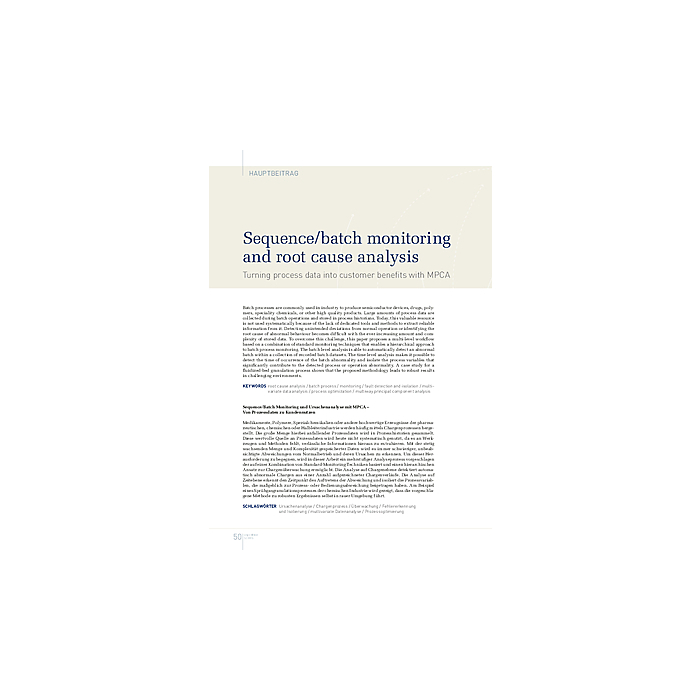Sequence/batch monitoring and root cause analysis
4,90 €
Auf Lager
Artikelnummer
03654_2015_05_04
Turning process data into customer benefits with MPCA
Batch processes are commonly used in industry to produce semiconductor devices, drugs, polymers, speciality chemicals, or other high quality products. Large amounts of process data are collected during batch operations and stored in process historians. Today, this valuable resource is not used systematically because of the lack of dedicated tools and methods to extract reliable information from it. Detecting unintended deviations from normal operation or identifying the root cause of abnormal behaviour becomes difficult with the ever increasing amount and complexity of stored data. To overcome this challenge, this paper proposes a multi-level workflow based on a combination of standard monitoring techniques that enables a hierarchical approach to batch process monitoring. The batch level analysis is able to automatically detect an abnormal batch within a collection of recorded batch datasets. The time level analysis makes it possible to detect the time of occurrence of the batch abnormality and isolate the process variables that significantly contribute to the detected process or operation abnormality. A case study for a fluidized-bed granulation process shows that the proposed methodology leads to robust results in challenging environments.
| Autoren | Moncef Chioua/ABB AG / Chaojun Xu/ABB AG / Heiko Petersen/ABB AG / Jan Schlake/ABB AG |
|---|---|
| Erscheinungsdatum | 01.05.2015 |
| Format | |
| Zeitschrift | atp edition - Ausgabe 05 2015 |
| Verlag | DIV Deutscher Industrieverlag GmbH |
| Titel | Sequence/batch monitoring and root cause analysis |
| Untertitel | Turning process data into customer benefits with MPCA |
| Beschreibung | Batch processes are commonly used in industry to produce semiconductor devices, drugs, polymers, speciality chemicals, or other high quality products. Large amounts of process data are collected during batch operations and stored in process historians. Today, this valuable resource is not used systematically because of the lack of dedicated tools and methods to extract reliable information from it. Detecting unintended deviations from normal operation or identifying the root cause of abnormal behaviour becomes difficult with the ever increasing amount and complexity of stored data. To overcome this challenge, this paper proposes a multi-level workflow based on a combination of standard monitoring techniques that enables a hierarchical approach to batch process monitoring. The batch level analysis is able to automatically detect an abnormal batch within a collection of recorded batch datasets. The time level analysis makes it possible to detect the time of occurrence of the batch abnormality and isolate the process variables that significantly contribute to the detected process or operation abnormality. A case study for a fluidized-bed granulation process shows that the proposed methodology leads to robust results in challenging environments. |
Eigene Bewertung schreiben


